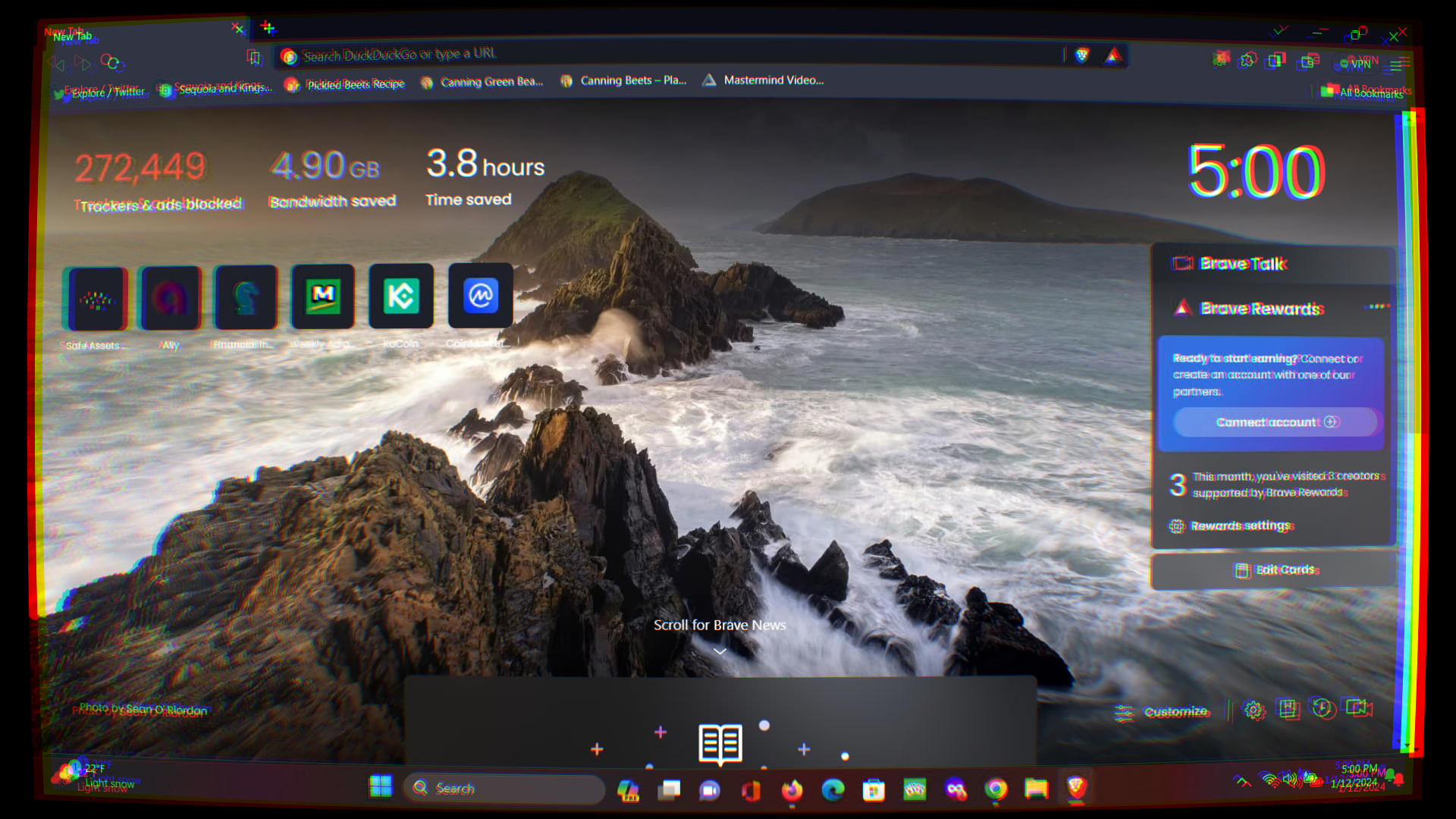Why I recommend against Brave.
-
A neutered fascist is still a fascist.
If one forks Chromium like Firefox has been forked to hell and back, then I view it as effectively taking the power out of Google's hands. The issue with Chrome supremacy is that Google gets to, directly or indirectly, shape how websites/the internet operates/are built/optimized (since web devs will use it to do their web dev).
So then wouldn't a better strategy be to make a Firefox-like, Chromium browser that is truly "neutral" (like Firefox is *on paper)? Also, remember that Mozilla receives a huge chunk of funding from Google, directly, in order to "keep Chrome from being a monopoly".
Now, that last part depends on whether you considering Chrome to be Chromium, which I don't. Here's my understanding/view, overall (feel free to cherrypick or challenge any of it; I welcome and respect your opinions/corrections):
-
Firefox has existed for longer than Chrome, but Chrome on release was leaner and faster (I speak from personal experience). The only other option was Internet Explorer, which was "Chrome" at the time (as in, average people defaulted to the "blue e" icon)
-
Chrome became the dominant browser because it was lean and fast for its time. It's obviously different now, but you cannot retroactively fault people for choosing an objectively-better browser [for the time]
-
Genuinely not defending Google here, but my opinion is that a large reason we began to transition from Web 2.0 to Web 3.0 is because of Chrome (and any other modern browsers). This meant Chrome-optimized sites that didn't work well with other browsers, but I view it as a no-fault situation (it's just how tech progresses; it breaks compatibility with existing tech sometimes)
-
Most people use "Google-everything" these days; I myself have had a Gmail account since it was a closed beta. This means they're more likely to lean towards Chrome, because Google recommends it anyway
So to me, the issues are actually that people default to Google-everything, including Chrome (thus feeding Google info about their entire lives, 24/7). But I don't see Chromium itself as evil. On its own, it's open-source (minus Google bits obviously), which is what allows forks to be made that not only avoid the Google bits, but outright block them. I think it's taking power back. I don't think "EVERYONE SHOULD SWITCH TO FIREFOX OR A FIREFOX FORK IMMEDIATELY" is realistic (and I say that as someone who switched back to Firefox months ago)
I also think that web devs themselves should stop being biased towards..."Chrome-sponsored" (figure of speech) best practices. But I also think that Mozilla should [continue] making their browser more compatible with modern websites, and even maybe get more involved in establishing web design best-practices (meaning practices/technologies that work well equally regardless of browser or rendering engine). In fact, recently Mozilla highlighted their Web Compatibility reporting tool, so that people can let them know about sites that don't render correctly in their browser
-
-
I don't use very many extensions, but it works with all of the ones I've tried such as uBlock Origin.
Thanks for Waterfox. Looks awesome.

-
If you are keen on personal privacy, you might have come across Brave Browser. Brave is a Chromium-based browser that promises to deliver privacy with built-in ad-blocking and content-blocking protection. It also offers several quality-of-life features and services, like a VPN and Tor access. I mean, it's even listed on the reputable PrivacyTools website. Why am I telling you to steer clear of this browser, then?
anyone believing brave is good for privacy is quite naive
-
But neutered Chrome (aka repurposed + degoogled Chromium) isn't the same as Google Chrome. I 100% understand what you're saying, but I wouldn't file this under "privacy" (at least not without some asterisks).
Forks of Firefox are still Firefox, no matter how neutered it is.
-
Forks of Firefox are still Firefox, no matter how neutered it is.
That's my point. So then what's the solution when there are essentially two mainstream/mainline browsers? How far do you believe one needs to take it? Is a fork that de-Mozilla's/de-Google's the browser enough (and changes the name)? Or is that "still bad"?
Because eventually you'll run out of [usable/daily-drivable] browsers, if you consider any fork to be "evil" by virtue of coming from Chromium/etc.
-
But neutered Chrome (aka repurposed + degoogled Chromium) isn't the same as Google Chrome. I 100% understand what you're saying, but I wouldn't file this under "privacy" (at least not without some asterisks).
its still furthering googles control of the internet, which is an inherent threat to privacy, regardless if you think you are participating in it or not.
-
If you are keen on personal privacy, you might have come across Brave Browser. Brave is a Chromium-based browser that promises to deliver privacy with built-in ad-blocking and content-blocking protection. It also offers several quality-of-life features and services, like a VPN and Tor access. I mean, it's even listed on the reputable PrivacyTools website. Why am I telling you to steer clear of this browser, then?
Thank goodness that we can post things in here without Braves astroturfed PR community like what happened when any story against brave posted on the other site
-
It's not a strawman, it's the problem.
It's a strawman you're still trying to prop up because the issue is not only the Brave browser itself, but the owners of it.
Even if we took your argument in good faith, it would still be flawed since Brave is based on Chromium, of which Google essentially controls at this point, so you'd still be supporting Google hegemony. In other words, even from that stance you've brought up, it would be a bad idea to use Brave vs Firefox, Librewolf, Konqueror, etc.
the issue is not only the Brave browser itself, but the owners of it.
I mean, that an issue, sure. But I gotta be honest with you, I care far more about the practicalities of the technology than the personalities behind them. So I guess that's where we see things differently. Don't let me get in your way on that front, if that's what really matters to you.
I see browsers as being problematic in general right now and new solutions are needed. If you're happy with tracking and spying at the browser level, then fine, but I'm interested in how we can put an end to that.
-
tldr:
- CEO was forcefully ousted from Firefox for anti-LGBTQ views and donations.
- Replaced existing ads on sites with Brave's own "private" ads.
- Collected crypto on behalf of others without their knowledge or consent
- Injected referral links into crypto websites to steal crypto revenue
- Put ads in the new page tab
- Shipped a TOR feature that leaked DNS
- Doesn't disclose the ID of their search engine crawler via useragent
- Removed "strict" fingerprinting protection
- CEO is generally a right-wing dick.
It's so "weird" how the same kind of person who would be openly anti-LGBTQ would also make a such a sketchy product.
-
What's wrong with ungoogled-chromium? Or Vivaldi?
I’m using brave lol. As a web developer I really need to test the work I do on a chromium based browser. Brave seems to be the best chromium based browser that still supposed ad blocking after the whole manifest v3 thing.
So let me pose this question to you. As someone that needs to use Chromium for work, what’s the best Chromium based browser that still supposed as blocking?
I get that Firefox is better. Heck Tor is even better. But realistically what is something I can actually use to get real work done?
-

-
I’m using brave lol. As a web developer I really need to test the work I do on a chromium based browser. Brave seems to be the best chromium based browser that still supposed ad blocking after the whole manifest v3 thing.
So let me pose this question to you. As someone that needs to use Chromium for work, what’s the best Chromium based browser that still supposed as blocking?
I get that Firefox is better. Heck Tor is even better. But realistically what is something I can actually use to get real work done?
Unironically, Ecosia has been working on a browser that's currently in beta with a built in adblocker. Works really well!
-
Okay, but that's not a privacy reason.
Isn't every chromium browser going to lose manifest v2 eventually, causing the real ublock origin to stop working?
-
its still furthering googles control of the internet, which is an inherent threat to privacy, regardless if you think you are participating in it or not.
Once again, that's not privacy (the context of this discussion). Your point is that using Chromium encourages websites (as in, developers) to keep making sites that are Chromium-optimized, instead of browser-agnostic.
When you take all the "Google" out of a browser, they're not getting any information from you because those mechanisms no longer exist. Again, I'm talking about Google and Chrome. You're combining 3 different "issues" and slapping a "PRIVACY" label on them.
-
I’m using brave lol. As a web developer I really need to test the work I do on a chromium based browser. Brave seems to be the best chromium based browser that still supposed ad blocking after the whole manifest v3 thing.
So let me pose this question to you. As someone that needs to use Chromium for work, what’s the best Chromium based browser that still supposed as blocking?
I get that Firefox is better. Heck Tor is even better. But realistically what is something I can actually use to get real work done?
This week I'm going to try out ungoogled Chromium and Vivaldi. I know Vivaldi is partially closed source, but I'm not actually in the camp that thinks all closed source is bad.
-
Isn't every chromium browser going to lose manifest v2 eventually, causing the real ublock origin to stop working?
I don't know about every Chromium-based browser, but I can tell you that I went back to Firefox and regret nothing (I was on Brave). Firefox has gotten a lot better lately, especially on desktop. For example, they added a native auto-PiP option, which is super helpful for those of us who watch YouTube/videos while flipping through tons of tabs.
-
anyone believing brave is good for privacy is quite naive
Bar better than chrome, edge or Firefox without modification
-
This week I'm going to try out ungoogled Chromium and Vivaldi. I know Vivaldi is partially closed source, but I'm not actually in the camp that thinks all closed source is bad.
I use Apple products which are definitely more closed source. I would prefer open source but there are unfortunately more variables in play then just “is it open source”.
-
anyone believing brave is good for privacy is quite naive
It's good for playing youtube without ads and Netflix which doesnt work with my firefox setup for some reason. That's all I use it for.
-
anyone believing brave is good for privacy is quite naive
It's good for privacy from the websites you visit, from itself is up for debate though lol




